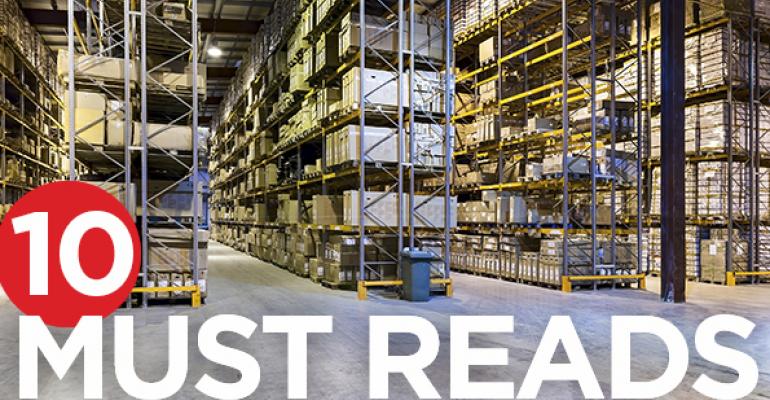- Carlyle Said to Target $5 Billion for New U.S. Real Estate Fund “Carlyle Group LP is preparing to raise an eighth U.S. real estate fund in the first half of 2017, people with knowledge of the matter said. The Washington-based private equity firm is planning to target $5 billion for the pool, said the people, who asked not to be identified because the information is private. A representative of Carlyle declined to comment. Carlyle closed its most recent North American real estate fund, Carlyle Realty Partners VII, in 2015, securing $4.2 billion in commitments.” (Bloomberg)
- The Crazy Demand Driving Industrial Real Estate Expected to Slow “Though e-commerce continues to power industrial real estate to record levels of occupancy and peaking rents, the general consensus among industry experts is that the sector may slow down this year. The anticipated growth deceleration will have little to do with economic factors. Demand continues to outpace supply, and major retailers and users persist in their scramble for warehouse and distribution space nearer to customers. Investors have been favoring the sector, so it's been experiencing record levels of acquisition spending and low cap rate.” (Forbes)
- Home-Buying Sentiment Index Slides for Fifth Straight Months “Surging mortgage rates, dwindling inventory, and soaring home prices are taking a toll on Americans’ attitudes toward ownership, according to a survey released Monday. The home purchase sentiment index compiled by mortgage finance provider Fannie Mae fell in December, its fifth straight monthly decline. Fannie’s index has six components. In December, two were lower compared to November, two were unchanged, and two increased. But the index was 2.5 percentage points lower than a year ago, with only one component higher.” (MarketWatch)
- American Apparel Sold in Bankruptcy Auction for $88M “Canadian apparel maker Gildan Activewear Inc said it had won a bankruptcy auction to buy U.S. fashion retailer American Apparel for about $88 million in cash. The deal is subject to approval from a bankruptcy court on Thursday, the company said. Under the deal, Gildan will acquire the intellectual property rights related to the American Apparel brand and certain manufacturing equipment. The company, however, will not buy any of the 110 American Apparel retail stores.” (New York Post)
- Commercial Mortgage Originators Expect Strong, Steady Market in 2017 “According to a new Mortgage Bankers Association survey of the top commercial and multifamily mortgage origination firms, U.S. commercial and multifamily mortgage lending is expected to increase in 2017, as lenders' appetites to place new loans and borrowers' appetites to borrow both remain strong. Nearly two-thirds (63 percent) of the top firms expect originations to increase in 2017, with one-quarter (26 percent) expecting an increase of 5 percent or more. A full half (50 percent) expect their own firm's originations to increase by 5 percent or more.” (World Property Journal)
- CREFC 2017: Morningstar Analysts Talk Risk Retention, Retail and Coworking “Following last week’s headlines surrounding Macy’s store closures and layoffs, there is no doubt that retail is on the brains of many as we begin the new year. At CRE Finance Council’s 2017 industry leader’s conference at Loews Miami Beach Hotel, Morningstar Credit Ratings’ top structured finance analysts Lea Overby and Steve Jellinek told Commercial Observer that they expect more bankruptcies in the already-struggling retail sector. The two pointed to the consolidation of electronics retailers and sporting goods stores as internet sales are increasing, and the continued woes of the Macy’s and Sears of the world.” (Commercial Observer)
- Mori Trust Enters U.S. with Big Boston Buy “Mori Trust Co. Ltd. knows how to make an entrance. The Tokyo-based real estate company has joined the brimming crowd of foreign investors in U.S. real estate with the formation of a U.S. subsidiary, Mori America LLC, and the acquisition of a premier office complex in Boston. Mori Trust snapped up 10 St. James Ave. and 75 Arlington St. from tenant Liberty Mutual in a partial sale-leaseback transaction. The price tag on the Class A assets: approximately $673 million, according to Suffolk County property records. 10 St. James and 75 Arlington last traded in January 2006, when Liberty Mutual acquired the buildings for $481.5 million.” (Commercial Property Executive)
- Apple is Planning a High-Tech Manufacturing Site in Arizona “Apple is asking permission to conduct ‘high-tech manufacturing’ in a facility in Mesa, Arizona, according to a notice published Monday. A notification published in the Federal Register said that Apple sought approval from the Foreign-Trade Zones Board to make "finished products" in a zone that will exempt it from customs duty payments. The request comes as Apple has faced criticism from President-elect Donald Trump for producing the iPhone and other products abroad.” (Fortune)
- BioMed Sells D.C. Area R&D Facility for $338M “HFF recently announced the $337.5 million sale of GSK Global Vaccine Centre, a three-building, Class A research and development facility in Rockville, Md. The company represented the seller, BioMed Realty, which is owned by affiliates of Blackstone Real Estate Partners VIII. HFF acquired the undisclosed buyer and also secured an acquisition loan through Goldman Sachs. According to Yardi Matrix data, the Class A asset last traded over a decade ago, in May 2006, when Human Genome Sciences disposed of the property as part of a portfolio sale.” (Commercial Property Executive)
- Amazon’s Aggressive Warehouse and Shipping Strategy is Paying Off “Convenience is becoming more important to shoppers at a time when retail is increasingly shifting to e-commerce. And one reason Amazon.com Inc. is such a formidable competitor in the e-commerce space is its ability to fulfill even last-minute shipping needs with the efficiency shoppers increasingly crave. Many traditional retailers relied more heavily on options like in-store pickup as time for shipping packages ran out. But Amazon, through a dense web of fulfillment and distribution centers and other delivery infrastructure, has been able to match the efforts of bricks-and-mortar retailers.” (MarketWatch)
0 comments
Hide comments

